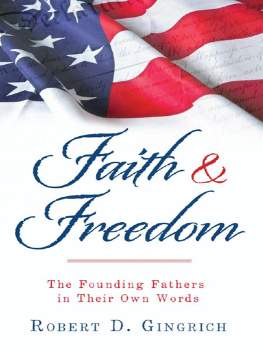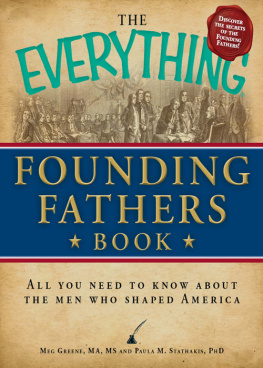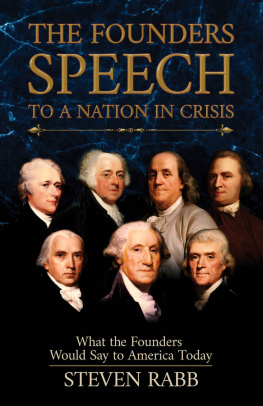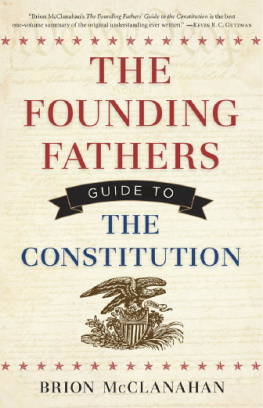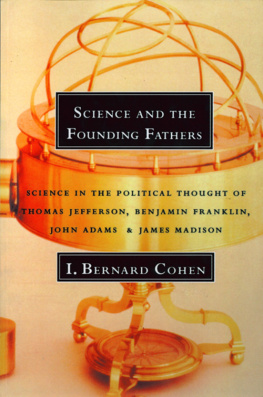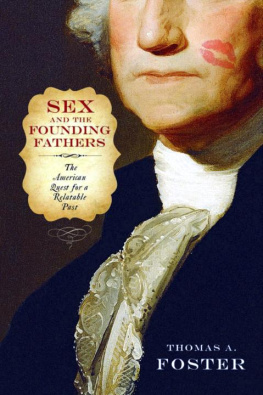
Introduction
This book is intended as a reminder to twenty-first-century Americans that most of the men we recognize as our nations Founding Fathers were exceptional people who were guided by their Christian faith in establishing the foundation upon which the United States of America became the most powerful and prosperous nation the world has ever known.
Regarding the importance of understanding our history, Supreme Court Justice Joseph Story wrote in his Commentaries on the Constitution (1833):
Let the American youth never forget, that they possess a noble inheritance, bought by the toils and sufferings and blood of their ancestors; and capacity, if wisely improved, and faithfully guarded, of transmitting to their latest posterity all the substantial blessings of life, the peaceful enjoyment of liberty, property, religion, and independence. The structure has been erected by architects of consummate skill and fidelity; its foundations are solid; its compartments are beautiful, as well as useful; its arrangements are full of wisdom and order; and its defenses are impregnable from without. It has been reared for immortality, if the work of man may justly aspire to such a title. It may nevertheless, perish in an hour by the folly, or corruption, or negligence of its only keepers, THE PEOPLE.
To properly understand our history, we need to know as much as possible about the men who were involved in making that history. It was faith in the God of the Judeo-Christian Bible that drove Americas earliest settlers to seek a place where they would have the freedom to live their lives and raise their children according to their deep-seated beliefs. Most of the Founding Fathers shared that same faith.
The Founding Fathers were students of the Bible, pointed out John Eidsmoe in his well-researched book Christianity and the Constitution. According to Eidsmoes research, fifty-two of the fifty-five delegates to the Constitutional Convention of 1787 were members of various Christian denominations. There was also one lapsed Quaker and sometimes Anglican, and one [alleged] open DeistDr. Franklin, who attended every kind of Christian worship, called for public prayer, and contributed to all denominations.
America is often called a Christian nation not because it was founded as such, but because its Founding Fathers were either Christians or had been influenced throughout their entire lives by the Christian consensus that surrounded them, Tim LaHaye said in his informative book Faith of Our Founding Fathers. Christianity is a way of life. And that way of life had so permeated this nation by 1787 that it extended its influence to every area, including the fields of law, government, morality, marriage, and business.
Because of space limitations, I focused on the lives and words of twelve of the most prominent of the more than 200 men who came to be known as Founding Fathers. In order to provide an accurate description of their character and intent, I felt it was fundamentally important to include direct quotations from the men themselves that unambiguously illustrate their thinking about God, the Bible, the proper role of government, and the nature of man.
All Americans should find inspiration in the wisdom, character, and faith of the people who designed a government that has provided more freedom, more opportunities to excel, and a higher quality of life for its citizens than any other nation in recorded history.
Making certain young Americans understand their history and their godly heritage is vital to the future of the United States and to the memory of the God-fearing, Bible-believing men and women who created that heritage. As author Michael Crichton points out, If you dont know history, you dont know anything. Youre a leaf that doesnt know its part of a tree.
Chapter One
Patrick Henry
Spirit of the Independence Movement
It cannot be emphasized too strongly or too often that this great nation was founded, not by religionists, but by Christians; not on religions, but on the Gospel of Jesus Christ. For this very reason people of other faiths have been afforded asylum, prosperity, and freedom of worship here.
P ATRICK H ENRY
On March 23, 1775, just twenty-seven days before the shot heard round the world was fired, Patrick Henry delivered a speech that ended with words that have become synonymous with his name: Give me liberty or give me death!
Much had been written and said in favor of American independence prior to Henrys famous exhortation. But historians have generally recognized that his passionate oration, in which he forcefully made the point that the colonies must now choose between freedom and slavery, was one of the most important events causing the smoldering embers of discontent to become a bonfire of revolution.
On April 19, the ongoing exchange of hot words and diplomatic wrangling between the thirteen colonies and the mother country was succeeded by an exchange of bullets and bombs during the battles of Lexington and Concord. That fateful day was immortalized by Ralph Waldo Emerson in his poem Concord Hymn, in which he mentioned the spirit that made those heroes dare to die, and leave their children free.
That spirit existed in abundance among the men we recognize as Founding Fathers, but two of them, Patrick Henry and Samuel Adams, have been honored with the special label spirit of the independence movement. Both men were outspoken Christians who reflected the principle recorded in 2 Corinthians 3:17: Where the Spirit of the Lord is, there is liberty.
Henry and Adams made frequent references to their belief that independence was God-ordained and that He would give them victory over a much stronger opponent, a conviction not universally shared by their fellow colonists. Although a substantial portion of the population had grave misgivings regarding armed rebellion against the British Empire, momentum in favor of separation reached critical mass following Henrys passionate exhortation, which he delivered following a couple of more conciliatory speeches by fellow delegates to the Virginia Convention. Every American should be familiar with Henrys brief but powerful words as recorded on March 23, 1775:
Mr. President: No man thinks more highly than I do of the patriotism, as well as abilities, of the very worthy gentlemen who have just addressed the House. But different men often see the same subject in different lights; and, therefore, I hope that it will not be thought disrespectful to those gentlemen, if entertaining as I do, opinions of a character very opposite to theirs, I shall speak forth my sentiments freely and without reserve. This is no time for ceremony. The question before the House is one of awful moment to this country. For my own part I consider it as nothing less than a question of freedom or slavery; and in proportion to the magnitude of the subject ought to be the freedom of the debate. It is only in this way that we can hope to arrive at truth, and fulfill the great responsibility which we hold to God and our country. Should I keep back my opinions at such a time, through fear of giving offense, I should consider myself guilty of treason toward my country, and of an act of disloyalty toward the majesty of heaven, which I revere above all earthly kings.
Mr. President, it is natural to man to indulge in the illusions of hope. We are apt to shut our eyes against a painful truth, and listen to the song of that siren, till she transforms us into beasts. Is this the part of wise men, engaged in great and arduous struggle for liberty? Are we disposed to be on the number of those who, having eyes, see not, and having ears, hear not, the things which so nearly concern their temporal salvation? For my part, whatever anguish of spirit it may cost, I am willing to know the whole truth; to know the worst and provide for it

